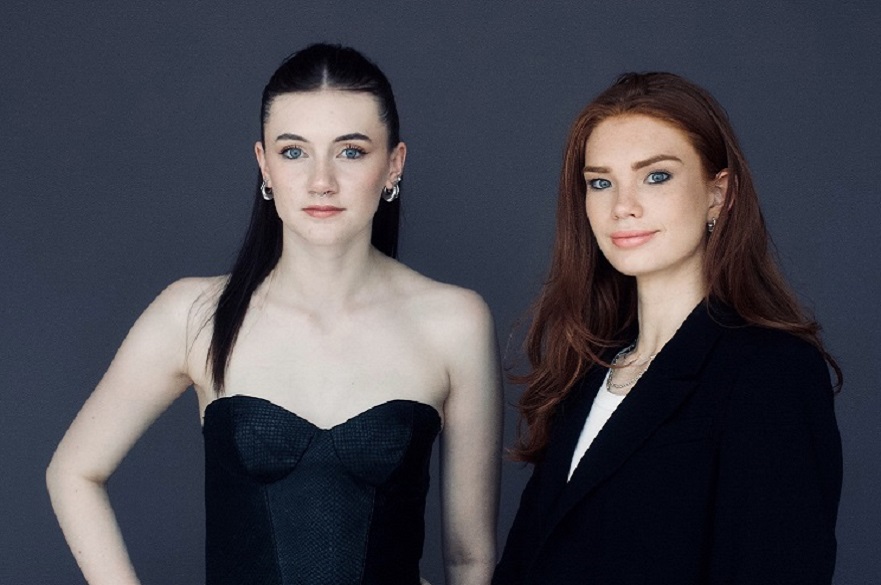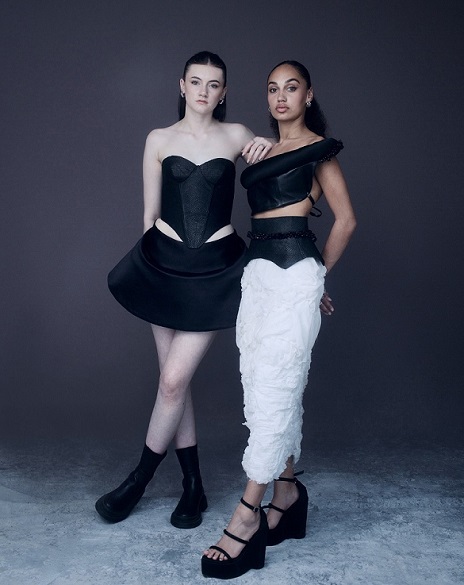Clothes made from fish skin deliver a message about sustainability
A corset made from real fish skin aims to deliver a message about sustainability from a Nottingham Trent University student.
By Chris Birkle | Published on 18 July 2022
Categories: Press office; School of Art & Design;

A corset made from real fish skin aims to deliver a message about sustainability from a Nottingham Trent University student.
Beatrice Hill, 22, created the garment using salmon skin which had been treated and turned into a leather as a message about fast fashion and the environment.
The fashion design undergraduate – who has also made a fish leather belt bag – wanted to show that using by-products of the food industry is more sustainable than faux materials.
Beatrice – who is a vegetarian – bought the material from a specialist supplier which normally provides fish leather for handbags and wallets.
As part of the project, she created her own fish leather by treating the skin with natural substances, including glycerine and water, and cleaning the material with an eco-lemon washing up liquid to remove the odour.

Beatrice's designs. Picture credit Lucas Mayo
Beatrice, originally from Pott Shrigley in Cheshire, who is studying in the Nottingham School of Art & Design, said: “Research shows that creating fake leather is worse for the planet in terms of carbon emissions than using materials that are otherwise ethical and sustainably available.
“A lot of good quality fish skin - which is sustainably farmed - is thrown away, but could be put to use. The world is not going to stop eating fish any time soon, and so it’s reasonable for by-products of the food industry to be used in this way.
“As my collection is about journeys, I chose to use salmon skin. All of the fish skins I treated in this project were sourced from the bin of a fishmongers which only sells sustainably farmed fish. In other parts of my collection, I used leather made from lamb skin, which was otherwise being thrown away. It’s all about using waste.”
The corset – which is intended to be worn as an outer garment - was made with ten fish skins which were roughly 60 centimetres long and sewn together as panels.
Like normal leather, the seams were hammered down and not ironed to avoid the leather shrinking. The final material appears seamless on the outside and has a slightly rough surface which is a result of the scales being removed. The inside has been lined with lamb leather.
Beatrice chose to create a corset because of her love of corsetry and how the garment can allow women to express themselves. But unlike traditional corsets, it’s not designed to be tight-fitting. Instead it’s intended to be complemented by a skirt that pushes out at the hips to exaggerate the female shape.
Lee Mattocks, Senior Lecturer in Fashion Design at Nottingham Trent University, said: “Beatrice has communicated a powerful and important message here in relation to clothing and sustainability, particularly as a vegetarian herself who cares for animals.
“By creating a fish leather corset, made entirely from ethically and sustainably farmed fish, she is demonstrating how beautiful garments of almost any kind can be made from by-products of the food industry, with a minimal impact on the environment.”
Notes for Editors
Press enquiries please contact Chris Birkle, Public Relations Manager, on telephone +44 (0)115 848 2310, or via email.
Nottingham Trent University (NTU) received the Queens Anniversary Prize for Higher and Further Education in 2021 for cultural heritage science research. It is the second time that NTU has been bestowed the honour of receiving a Queen’s Anniversary Prize for its research, the first being in 2015 for leading-edge research on the safety and security of global citizens.
The Research Excellence Framework (2021) classed 83% of NTU’s research activity as either world-leading or internationally excellent. 86% of NTU’s research impact was assessed to be either world-leading or internationally excellent.
NTU was ranked second best university in the UK in the Uni Compare Top 100 rankings (2021/2022). It was awarded Outstanding Support for Students 2020 (Times Higher Education Awards), University of the Year 2019 (Guardian University Awards, UK Social Mobility Awards), Modern University of the Year 2018 (Times and Sunday Times Good University Guide) and University of the Year 2017 (Times Higher Education Awards).
NTU is the 5th largest UK institution by student numbers, with nearly 39,000 students and more than 4,400 staff located across five campuses. It has an international student population of 7,000 and an NTU community representing over 160 countries.
Since 2000, NTU has invested £570 million in tools, technology, buildings and facilities.
NTU is in the UK’s top 10 for number of applications and ranked first for accepted offers (2021 UCAS UG acceptance data) It is also among the UK’s top five recruiters of students from disadvantaged backgrounds and was the first UK university to sign the Social Mobility Pledge.
75% of NTU students go on to graduate-level employment or graduate-entry education / training within fifteen months of graduating (Guardian University Guide 2021).
NTU is ranked 4th most sustainable university in the world and 1st in the UK for sustainability-themed Education and Research in the 2021 UI Green Metric University World Rankings (out of more than 900 participating universities).